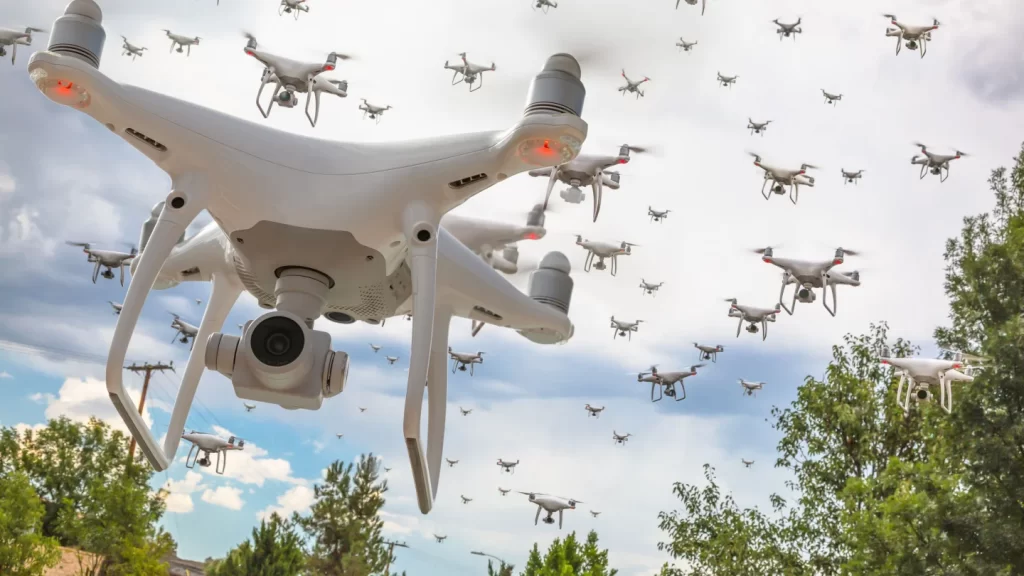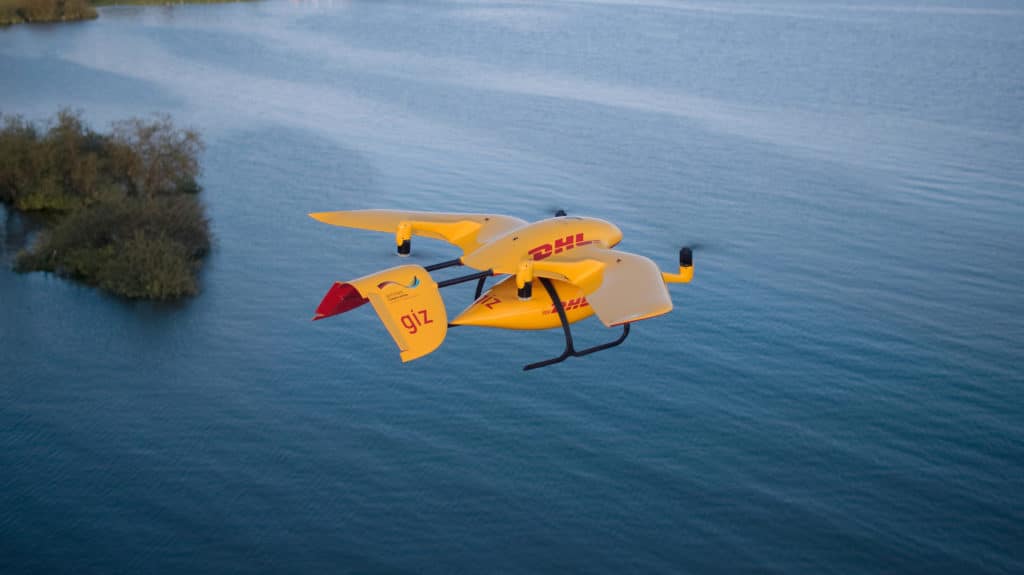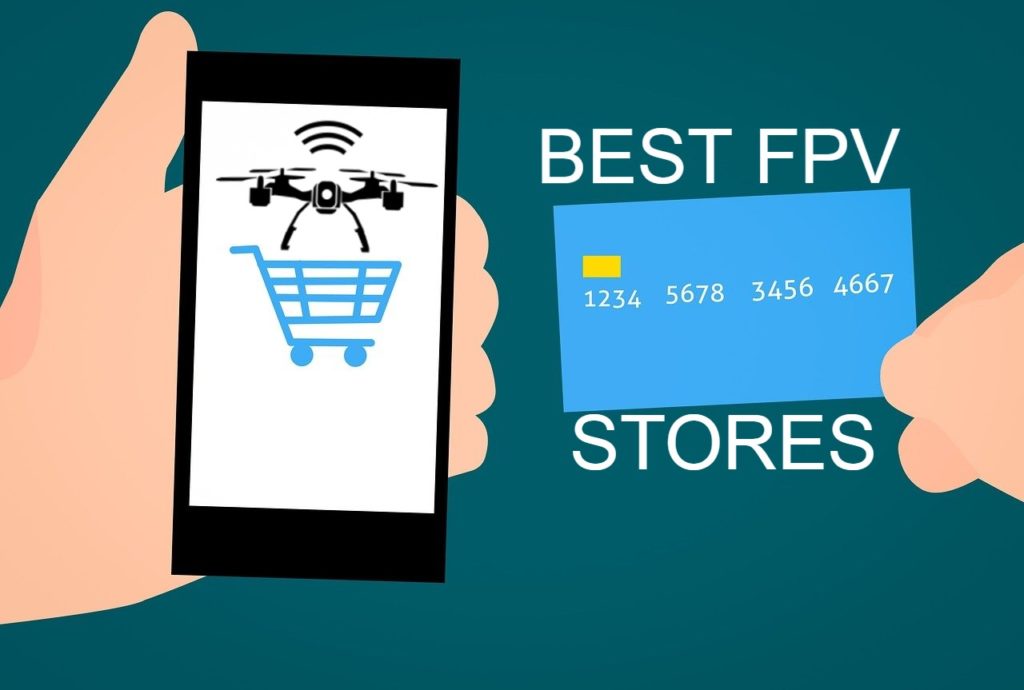Despite what you might hear, the drone industry is not new. It may be relatively young compared to other industries, but you are not ahead of the curve because you’re looking to start a drone business at this point in time. The drone industry does not get much media coverage compared to how vast it is, and so generally when people are looking to start a business, the circumstances are very similar.
- They just bought a DJI (or similar off-the-shelf, finely tuned aircraft)
- They believe drones are the future (without much reason why)
- They believe they can benefit from a first-mover advantage (without knowing the current state of the industry)
For context, a lot of the drone hype died in 2018 when many companies and drone programs went under. There was a bubble around the technology and people were bullish that drones could be applied to anything and solve everything. Since then, the industry has slowly crawled back with a focus on the use-cases where drones provide real, tangible value. Drones may not be able to do everything, but they sure can do a handful of things really, really, well.
There are a million websites telling you that you can start a profitable drone business today! I haven’t seen one expert write those articles with any real depth so I’m here to run you through the realistic options.
To clarify, these business ideas are not ‘What can I use my drone for?’. They don’t necessarily require that you even own a drone, but I would class them as a product or service within the framework of the drone industry. So, here are my recommendations for businesses in the drone industry.
Top 3 Drone Business Ideas
My Top 3 Drone Business Ideas are best suited for drone pilots with some experience. This is not to say that a complete beginner won’t be able to successfully build one of these businesses, I just believe you will have a better chance if you have some contextual understanding of drone hardware and drone operations.
Finally, how do I know these are good business ideas? Because I run a complex drone operation and I’ve spent a lot of time searching for businesses that offer these exact products and services. In fact, if you successfully build one of these businesses over the next 2 years, please let me know via our contact form. We may have work for you!
#1 – Drone Pilot Contracting Company
The idea is simple: build a network of drone pilots and sell the management of their services. Essentially, you will have agreements with a large number of drone pilots across your region, that they will subcontract for you for various projects. Now don’t be fooled by the simplicity of this idea, there are companies that already do this to varying degrees. What you need to aim for is ease of use.
You should be positioning this service as a way to help existing drone programs to rapidly scale. The two main customers for a service positioned this way are:
- Drone start-ups that are starting to expand, i.e. Especially drone programs that only require occasional drone flights. It is cheaper to hire on a job by job basis rather than hire an internal team.
- Established industries looking to implement or scale a drone program, i.e. A telecommunications company, simply requiring daily inspections across the country. This service removes the internal paperwork and compliance hurdles.
There are 3 levels to this kind of system as far as I can see. The first level being, build a network of drone pilots and manage them. The main value in the simplest system, is that companies can come to you to, source drone pilots in (or close to) the location of choice and also rely on you to manage the communications, logistics and feedback with the pilots.
Example: RoofAssess is an inspection company. They need pilots on the other side of the country with a Mavic 3 to conduct 60 roof inspections within 2 weeks time. They will come to you to source enough drone pilots with the appropriate skills, qualifications and equipment. RoofAssess doesn’t want to talk to any pilots, they just want the final data. You handle all the details to deliver the project on time, this includes solving any problems as they arise.
The second level is to truly make this a turnkey solution. You will need to find ways to streamline the induction process for working under a given company’s procedures, guidelines and even usage of particular aircraft and equipment. Companies may require that you and your drone pilot network comply with their policies when operating under them. Additionally, they may require some very particular qualifications or licenses. Your job will be to figure this out and make it as easy as possible to tick all the boxes.
Example: RoofAssess need pilots who can operate a big inspection camera that weighs 30kg. They approach you to prepare 5 pilots spread across the country that can conduct this specialized operation once a quarter. They provide you a brief, supply documentation and fill out a request form, and then you are left to sort out the details for the rest to make this happen. You will need to fly each pilot in to get trained and certified on the aircraft just to start. The quicker you can make this process, the better for everyone and your bottom line.
The final level is to actually build a framework to duplicate this network and system in any country. If you can replicate this in any country using local drone pilots, you effectively provide drone companies a way to easily expand into new regions with little to no start-up hurdles. That kind of a system is mind-blowingly valuable. Survey your existing clientele in order to strategically choose your expansion regions.
Example: RoofAssess are happy with your local services. They advise you they are wanting to expand to India over the next 12 months. You simply replicate the system you have already built, however this time you will be engaging local Indian drone pilots. There will be some language barriers but essentially your on-boarding, your training and your management remains the same. You can effectively ensure a fully functional expansion into a new region within a month or two. That’s invaluable!
#2 – Complex Operations Hardware
The idea for this one is simple, however the execution can be quite difficult. Everyday, more and more companies in the drone industry are moving towards complex operations. These operations are highly valuable and add a lot of extra capability to a drone program. The main ones include:
- Beyond Visual Line-of-sight (BVLOS) – Flying further than you can see, or flying outside your ability to maintain eyesight on your aircraft
- Swarming – Operating multiple drones with a single pilot
- Operations Over People – Flying drones overhead of the general public or in public spaces
- Remote Operations – Operating your drone from a location other than in the immediate region the aircraft is flying.
The business here is to build out a suite of hardware and software that can facilitate any one of these complex operations, preferably all. As drone programs expand into these areas, they will neither have the equipment nor the expertise in order to quickly adapt their systems to meet this goal.
If you can provide easy integration to a drone company’s existing fleet in order to enable one of these complex operations…boy… you’re sitting on a goldmine.
Example: RoofAssess has a fleet of 15 DJI Matrice 300, and now they have been approved to conduct remote operations. They no longer need to deploy drone pilots but rather can send a team of inspectors to do ground surveys, whilst a drone pilot sits in the office and fly’s different drones remotely located across the country. The problem is, the M300 doesn’t necessarily provide an easy way to control them outside of the direct control link from the RC.
This is where you come in! You’ll have the proper hardware to attach to the drone, to enable LTE control of the aircraft. Then you’ll have the right software to monitor and control various drones in different locations. Hell, you can even make recommendations on the laptops and monitors used for the office-based GCS. Sell ‘em some robes and slippers while you’re at it, coz they won’t be needing to do much once you’re done.
I’m not even saying you need to stock the hardware or be an expert in any of the products you are selling. Your job is to source each individual component, find a supplier and bring the pieces to the customer as a whole package. Whether you retail the products or not, your main goal is to consult on the development process. That’s where your value will be. You can always bring in the real suppliers to do training on their individual part.
#3 – Drone Hardware Hacking
There are a lot of consumer drone options that are really well tuned, easy to use with a quality build. For most drone pilots, they are spoiled for choice in the sub 7kg range of aircraft. A lot of professional pilots won’t even have any use for aircraft outside of this range.
There is a major gap in the market for well-built drones that can carry 10 kg or more. I cannot list on one hand, the number of reliable heavy-lift drone manufacturers across the entire globe. Here’s the current dilemma:
- The ones that are well-built are not open-source
- The open-source ones are not well-built
This just means that if you are using a well built aircraft, you won’t be able to easily customize it to conduct custom missions. You may even be limited to flying it with specific software. This is definitely a problem for new applications of the technology that wasn’t intended by the manufacturer.
With the open-source systems, you’ll be able to control the aircraft in various ways, plus integrate whatever external systems you’d like. The problem here is that these companies do not have enough extensive testing of their systems. As they don’t hold much market share in the profitable consumer markets, they can’t allocate enough funds to properly stress test their systems. Therefore the tuning is poor, the hardware is subpar, and the structural integrity is questionable.
Finally, to the business idea. Crack the well-built systems to allow for customizability. Find a way to hack into the systems in order to use the hardware in a way the manufacturer didn’t intend. (bye bye warranty).
Whether we’re talking about becoming an integration specialist to allow for attaching new devices to the aircraft, or cracking the flight controller to take full control of the aircraft automation. I’ve even come across people who can crack the batteries to allow for battery telemetry to run on any flight control software.
Many businesses are relying on well-built aircraft from these established manufacturers. Companies and governments around the world already hold a fleet of these brands. This is a whole market of untapped potential due to the limitations set by the manufacturer. Be the one to unlock this potential, and get paid doing it.
Other Business Ideas
The rest of the business ideas can be conducted by newbies, but once again, some industry experience can set you apart from the crowd. I’d recommend getting a job in a drone company first, whether it’s as a pilot or a support role. It’ll be beneficial to understand the typical operation before trying to reinvent the wheel.
By no means should you feel discouraged to try. I’m all about the hustle. If you want to do it, and believe you have what it takes… go hard! There is always room for competition and innovation in this industry.
You’ll see all of these suggestions in almost any business idea article, so aside from providing the basics on each idea, I’ll also add a little critical commentary on the business viability. These are in no particular order.
#4 – Aerial Photography & Videography
Provide high-quality aerial photo and video for real estate listings, events, or landscapes. This is the most typical one, as all consumer drones have cameras, it’s become the most saturated market. My only suggestion is to first, be a great photographer or videographer. The drone is just a tool, if you can’t take good shots, a flying camera won’t help you.
#5 – Infrastructure Inspection
Use drones to inspect bridges, towers, and buildings for maintenance needs. Specialized equipment is key to this particular job. Whether you have high zoom, high resolution or a LiDAR sensor, you’ll need more than the typical photography gear to excel in this business.
#6 – Agricultural Mapping
Provide farmers with detailed aerial maps of their fields to aid crop management. You’d better know crops, farming, or NDVI data analysis because you won’t get away with just owning a drone with this one. Farmers will need proof of your service’s value and demonstrated expertise. They can, and are buying their own drones these days, so you’ll have to be quite convincing as to why your service is better than their own.
#7 – Disaster Relief/ Search & Rescue
Use drones to survey disaster-stricken areas or find missing persons. You will need explicit permission from emergency services on this. You will need to work closely with emergency services and first-responders in order to understand the logistics of the mission and how to facilitate the process without causing additional risks.
#8 – Construction Site Monitoring
Offer progress tracking and inspection services for construction projects. A very simple point-of-interest flight can be done on a consistent basis. This is not very complex or difficult. The main way to succeed is to have the connections into the industry or simply be good at sales (like every business).
#9 Event Coverage
Cover festivals, concerts, or parades from unique angles. In most countries, you cannot fly over or close to people. If you’re able to get an exemption or waiver to that rule, you’ll be primed to succeed in this business. I would expect to need an aircraft with multiple redundancies and also an extensive risk assessment.
#10 – Pipeline and Power Line Inspection
Use drones to inspect pipelines and power lines, especially in remote areas. Generally these are conducted using long-range fixed wing and VTOL aircraft. Don’t expect to win any contracts with a Mavic.
#11 – Insurance Claims
Offer services to insurance companies to assess property damage after disasters. A very common practice for roof inspections. These companies often use external pilots to do their inspection data capture. The key here is securing regional contracts then having the capacity to service them.
#12 – 3D Modeling
Offer services to create 3D maps of landscapes, buildings, etc. This is a very particular skill, so work on refining it. They can be amazingly useful, but they can be frustrating to stitch and generate if you get your data capture wrong. Practice, practice, practice.
#13 – Drone Racing Events
Organize drone racing events or training courses.Those who love racing, really love it. Critics claim the industry is not a great spectator sport and therefore has a very real cap on its market potential.
#14 – Drone Retailer
Sell various models of drones and their accessories. This is straightforward. My only recommendation is that you work on systems to get last minute aircraft and parts. I often need to make large purchases at the drop of a hat, and the suppliers who can get me the items fastest win.
#15 – Drone Repair
Offer repair and maintenance services for drones. As with sales, speed is key. If I’m going to pay you rather than send it back for warranty assessment, I’d better be getting it back in a couple of days. DJI’s repairs can take weeks to months. 10x a reduction in their timeframe and you’re in business.
#16 – Drone Rental
Rent out drones for those who need them for a short period. I think this idea is viable as I’ve been in many positions wanting to rent a couple aircraft types but not having many options on the market. I recommend focusing on niche aircraft configurations like VTOLs or heavy-lift multi-rotors. This allows people to trial the airframe to determine whether it is suitable for their purposes. You can probably sell too.
#17 – Drone License or Training Courses
Teach people how to safely and effectively fly drones or get certified to provide licensing or help pilots pass their licensing exam. I think the formula for this is, promise people that the drone market is growing rapidly and there will be many opportunities if they get their license now, sell them a course, then leave them to figure out the job openings for the simple ‘pilot’ role is limited. I don’t like it but it is too commonplace….
#18 – Drone Show Entertainment
Organize drone light shows for events or celebrations. This will require some heavy infrastructure as well as the proper approvals to fly a large quantity of drones to a single (or few) pilots. There are so many of these companies popping up recently and a lot of them are venture-backed. You might want to focus on a local scene if you’re starting this.
The Not Recommended List
Drone Delivery
Unless you have a large investment of capital, you’d be wasting your time trying to start a delivery business. Logistics is about scale and efficiency, none of which you can achieve with 1 drone. You will also have to jump through a number of regulatory hurdles for flying BVLOS, over people and critical infrastructure etc. Even Amazon is struggling with this one.
FAQs
How can I start a drone business?
Once you have a business in mind, or a plan drafted, you’ll need to register your business with any local authorities. You will need to determine what expenditure is necessary to start generating revenue. Do you need a drone or can you rent one? Do you need an office, or can you train people in a field? These questions for the bare necessities to start to deliver your service, are the best first step.
How much does it cost to start a drone business?
First step is to determine what goods or services are required in order for your business to be able to make its first sale. Do you need a drone? A Mavic 3 should be the bare minimum for any service related business, so that cost would be around $1,500. Is it a better idea to rent one? These types of questions will help build out the start-up costs.
Do I need a license to operate a drone business?
Yes, in many countries, commercial drone operators are required to obtain a license or certification. However, under a certain weight limit, anywhere from 250g-2 kg depending on your location, you won’t need a license.
How profitable is a drone business?
In such a competitive market, it can be a race to the bottom. You need to set a threshold for profitability on each job in order to make it worthwhile. Drones are intended to provide increased safety and efficiency to traditional activities, this would imply drones should be at 10-30% profit margins. Drone services are likely to be the least profitable businesses in the drone industry as they are not competing with traditional methods, but rather with the vast array of direct competitors.
Where can I learn more about drones?
Right here. We are doing our best to build Defining Drones up to be a hub for industry research. We are still in the early days and would love to get some feedback from you as to what kind of information you’re looking for.
Conclusion
This industry is growing rapidly but that does not mean every opportunity is weighted equally. Be strategic, critical and realistic with any business idea you decide to run with. My honest advice is to maximize your strengths in whatever endeavor you choose. Find a way to leverage your existing skillset and apply that to deciding what drone business is best. I personally started with Real Estate marketing back in 2016. It sucked then and it sucks now… for me. But I wouldn’t be running a highly complex operation of heavy-lift drones today if I didn’t start with taking photos on a Phantom 4 Standard all those years ago.
So just go for it. Every 1 minute you delay starting, the drone industry progresses 5 minutes. Don’t get stuck in analysis paralysis, or do…. By continuing on our site lol. Start with learning how much money drone pilots can make.




